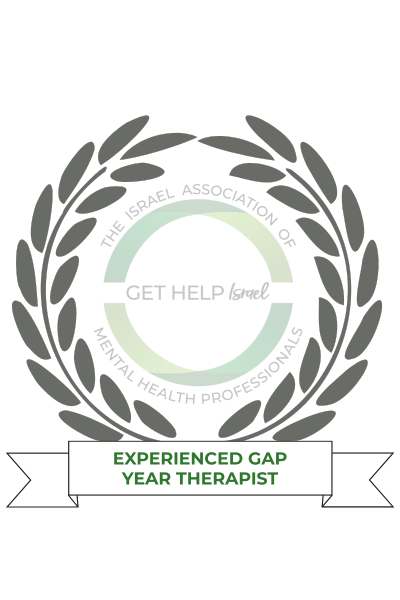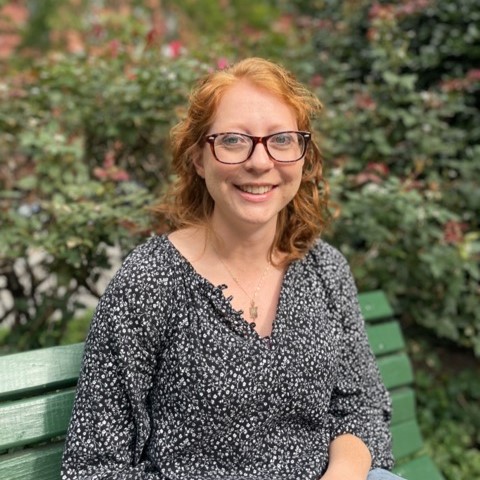Elizabeth Foote
Credentials
Finances
Licensed Abroad
- Shalom Aleichem 13, Office 931
- Tel Aviv
- Email Me
-
 Business HoursEvenings
Business HoursEvenings
Elizabeth Foote
 Verified
Verified
Credentials
Licensed Professional Counselor
MA
Finances
350-500 NIS
N/A
Sliding Scale | Free Consultation
ABOUT THE THERAPIST
I am an Olah Chadasha from the USA (Baltimore, MD) and I am a licensed counselor in the state of Maryland (LCPC).
My approach to therapy uses a mix of empirically supported treatments (Cognitive Behavioral Therapy, Dialectical Behavioral Therapy, Acceptance and Commitment Therapy) and client-centered therapy. My goal is to build a strong therapeutic alliance by getting to know my clients as humans and identifying their unique needs. I believe that the relationship between the client and the therapist is one of the most important predictors of positive changes in therapy. We will work together to outline a treatment plan that focuses on your needs and meets you where you are in the therapy process.
I have specialized training in working with individuals struggling with eating disorders. I received eating disorder training in inpatient, residential, partial hospitalization, and intensive outpatient settings. I have been working in private practice for 5 years.
I have also received training in a cognitive treatment for OCD called Inference-Based Cognitive Behavioral Therapy (ICBT). ICBT provides an alternative to exposure therapy and is shown via research to be equally effective. For those struggling with both OCD and eating disorders, we can incorporate ICBT into treatment as best fits your needs.
In addition to eating disorders and OCD, I enjoy working with individuals struggling with mood concerns, anxiety, and general life adjustment. I have training in Cognitive Processing Therapy for those struggling in the aftermath of trauma. As a new olah, I am familiar with the experience of moving to a new country and the variety of emotions people experience during this time of change.
If you are looking for a therapist, you're acknowledging that you're struggling in some way and would like support. Choosing to seek out that support is a sign of strength and resilience.
If you are interested in learning more about me and my practice, feel free to email me. I offer free 15-minute phone consultations for prospective clients.
I look forward to hearing from you!
QUALIFICATIONS
MA
Towson University
2019
Degree
MAEducation
Towson UniversityYear of Graduation
2019Years in Practice
5
LICENSED ABROAD
License Category
Mental Health CounselorLicense Number
LC12107/MDDISTANCE COUNSELING
Online Therapy
PRIMARY SPECIALTIES
Anxiety / Panic
Depression
Eating Disorders
Obsessive Compulsive Disorder (OCD)
Self-Harm / Suicide
ADDITIONAL SPECIALTIES
Adjustments
LGBTQ
Life Transitions
Mood Disorders
Self-Harm / Suicide
Stress Management
Trauma / Post Traumatic Stress Disorder PTSD
CLIENT FOCUS
Population
Adolescents
Adults
Men
Women
LGBTQ
Languages Spoken
English
TREATMENT APPROACH
Acceptance and Commitment Therapy (ACT)Acceptance and Commitment Therapy (ACT) is a form of psychotherapy that encourages individuals to accept their thoughts, feelings, and experiences without judgment and to use them as tools to help them to make changes in their lives that are consistent with their values. It is based on the idea that by changing the way we think about our inner experiences, we can reduce emotional distress and increase our sense of well-being.
Cognitive Behavioral Therapy (CBT)Cognitive Behavioral Therapy (CBT) is a type of psychotherapy that focuses on how one's thoughts, feelings and behaviors are connected and can be changed. It is based on the idea that how we think (cognition) and how we feel (emotion) can influence how we behave. CBT helps people identify and challenge distorted thinking and replace it with more balanced thinking, leading to improved mood and behavior. ‘Homework’, usually containing practical writing exercises, is often completed by the client between sessions to reinforce the therapy. Examples of tools that practitioners often use are journaling, challenging beliefs, and mindfulness.
Cognitive Processing TherapyCognitive Processing Therapy is used to treat trauma and PTSD. During therapy, clients identify and understand their beliefs about their responses to their trauma. Inspecting their beliefs often leads clients to understand their emotions and thoughts in relation to the trauma. When the client is ready, practitioners give them tools to challenge their thoughts of the trauma as well as provide homework to solidify what they learned in sessions. In the later stages of therapy, practitioners teach clients how belief systems (about safety, self-esteem, trust, intimate relationships, control, and power) can change after trauma.
Dialectical Behavior Therapy (DBT)Dialectical Behavior Therapy (DBT) is a type of cognitive-behavioral therapy developed by Marsha Linehan to help people learn to better manage and cope with emotions and stress. It focuses on developing skills and strategies to help regulate emotions, improve relationships and communication, and reduce self-destructive behaviors. Through DBT, people learn to identify and modify unhealthy thoughts and behaviors, while also learning to accept and validate their own feelings. DBT teaches skills to help individuals become aware of and accept and regulate their emotions, tolerate distress, and improve interpersonal relationships.
Mindfulness-Based Cognitive Therapy (MBCT)Mindfulness-Based Cognitive Therapy (MBCT) is a form of therapy that combines cognitive behavioral therapy with mindfulness practices. It is based on the idea that our thoughts, emotions, and physical sensations can affect our mental health. MBCT helps individuals become aware of their thoughts, emotions, and physical sensations in order to gain insight and control over them. MBCT helps clients learn how to recognize their sense of being and see themselves as separate from their thoughts and moods. This separation can free the client from thought patterns in which the repeated negative messages may be dominating the client’s focus. After developing an awareness of the separation between thoughts, emotions, and the self, people in treatment may find that while the self and the emotions may exist simultaneously, they do not have to exist within the same dimension. The healing can take place when one learns how to interject positive thoughts into negative moods and thereby create a shift in mood.
Person-Centered Therapy (Rogerian Therapy)Person-centered therapy, or Rogerian therapy, was developed by Carl Rogers in the 1940’s. It is a form of talk therapy that emphasizes the importance of providing psychological safety, unconditional positive regard, and empathic understanding to clients. This type of therapy is based on the belief that individuals have an innate capacity for self-actualization and self-understanding and that the therapist's role is to provide a supportive environment in which this process can take place. Through the use of active listening, open-ended questions, and non-judgmental reflection, the therapist helps the client to explore their thoughts, feelings, and experiences in a safe and accepting environment. By doing so, clients are able to gain insight into their issues, develop a greater understanding of themselves, and work towards personal growth.
Solution-Focused Brief Therapy (SFBT)Solution-focused therapy is a type of therapy that focuses on what is going right in a person’s life, as opposed to what is going wrong. It is based on the premise that when a person can identify what is working, they can build on it and make positive changes to the areas of their life that need improvement. A therapist using this approach will often ask questions designed to bring out a person’s strengths and resources, rather than focusing on problems or past issues. The aim of this type of therapy is to help people find solutions to their current problems, in order to build a better future. A solution-focused therapist encourages those in treatment to develop a vision of the future and offers support and guidance as they determine the skills, resources, and abilities needed to achieve that vision successfully.
Trauma-Focused Cognitive Behavioral Therapy (TF-CBT)Trauma-Focused Cognitive Behavioral Therapy (TF-CBT) is an evidence-based practice used to help children, adolescents and their parents who have experienced a single or multiple traumatic events. This type of therapy combines cognitive and behavioral strategies to help people process their traumatic experiences, manage their distress, develop coping skills, and restore their sense of safety and well-being. TF-CBT focuses on education and skill-building, creating an environment of safety and trust, and using therapeutic activities to help people understand their responses and control their symptoms. Children are shown how perceptions may be distorted and are given the tools to redesign those perceptions. TF-CBT is a skills-based model, and it requires the child and parent to practice its components in order to be optimally effective. Parents and children are commonly asked to practice skills at home.
SERVICES OFFERED
Individual Therapy
Group Therapy
Consultation

Therapist's Experience with Gap Year Students
I have been working with Gap Year Students since arriving in Israel (2023). I specialize in eating disorders, mood/anxiety, and adjustment to different cultural norms when studying in a foreign country. I enjoy supporting students in making their gap year the best experience possible!

 Verified
Verified


